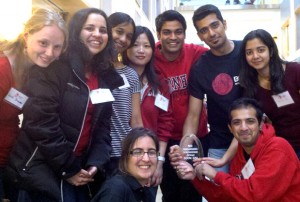On January 1, the editor-in-chief position at the LII’s VoxPopuLII blog changed hands. Rob Richards, whose incredible work over the last two and a half years has defined VoxPop as an important resource for anyone working in legal informatics, has decided to devote more time to his PhD studies at Penn State. Somehow, he continues to read, understand, and tweet everything in the field, thus giving weight to some of the wilder theories about him (one of the more popular ones is that he is really Thomas Pynchon, and also never sleeps). We are immensely grateful to him.
Rob is succeeded by two people: Stephanie Davidson (currently at the University of Illinois) and Christine Kirchberger (from Stockholm University). Each will be familiar to VoxPop readers from their earlier posts, and we are delighted that they have agreed to take the helm.
Stephanie earned her J.D. at Notre Dame Law School and her M.L.S. from Indiana University. After 5 years of reference and instruction at Yale Law School, Stephanie returned to the midwest to be Head of Public Services at the University of Illinois College of Law Library, where she has been since 2005. Her current scholarship focuses on informing law librarianship through a greater understanding of the research methods and practice of legal scholars and other legal researchers.
Christine Kirchberger earned her Law Degree from the University of Vienna, Austria, in 1997. In 2001 she joined the Swedish Law and Informatics Research Institute (IRI) at Stockholm University. Christine has been teaching legal informatics to law students and computer scientists, both in Sweden and at King’s College in London, England. Since 2006 she has been writing her doctoral thesis ‘Legal Information as a Tool’ focusing on legal information retrieval, the concept of legal information and the information-seeking behaviour of lawyers. In 2010 she authored Cyber Law in Sweden, as part of Kluwer’s International Encyclopaedia for Cyber Law.
We’re feeling a little guilty about this belated announcement… and trust that you’ll join us in welcoming Stephanie and Christine. We’re looking forward to their contributions!




 Today we presented a
Today we presented a  Most of you will have seen this tweeted by now, but our
Most of you will have seen this tweeted by now, but our